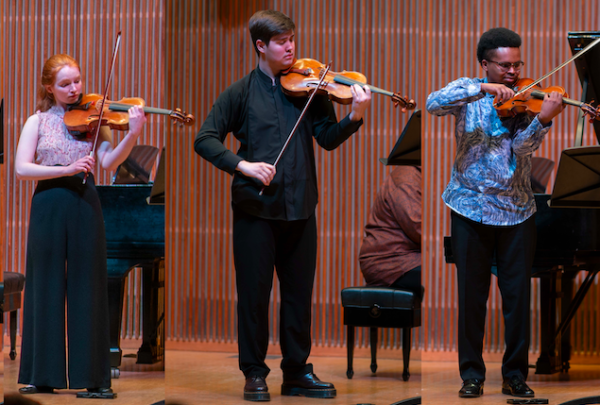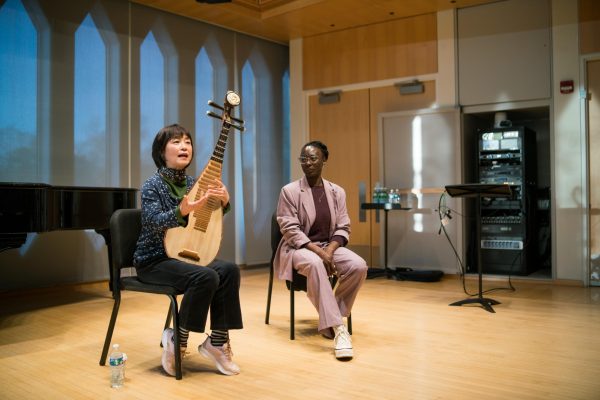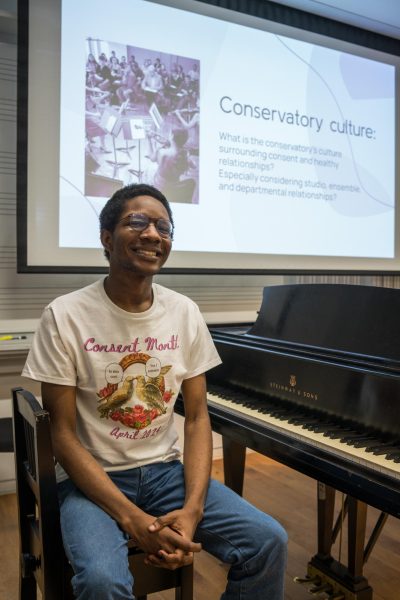Sonny Rollins Jazz Ensemble Plays Final Concert
The Sonny Rollins Jazz Ensemble, the premier Conservatory Jazz ensemble, played its final concert of the year at the Allen Memorial Art Museum on May 5. The group is named after legendary saxophonist Sonny Rollins, who provided the financial support for the group’s creation and a core vision for its focus to center both musical performance and community service.
Ensemble membership is determined by Jazz professors who select students based on a set of four standards: an audition for the Jazz faculty, academic accomplishment, public service, and a written response to a question about jazz and its place in the world.
The creation of the Sonny Rollins Jazz Ensemble was a multi-step, multi-year process stretching back to 2018 that involved distinguished author and Oberlin alum James McBride, OC ’79, Professor of Jazz Guitar Bobby Ferrazza, and Sonny Rollins himself. The initial plan was for Rollins to donate a sum of money to create a scholarship for an individual student, but due to a change in the amount of money for the scholarship, a new plan was devised — an idea that reenvisioned the scope and impact of Rollins’ donation.
“What happened originally is that Sonny Rollins was looking for a school to partner with to pass along some of the ideals he thought were really important,” Ferrazza said. “We can reduce those ideals down to the importance of helping others.”
Ferrazza explained that after hearing about the change in the amount of money being donated, he took a day to rethink how the money could be used. He came up with the idea of using Rollins’ scholarship to create an endowed ensemble that rotated yearly.
“The idea of a group is actually way more compelling to me because it gets to the entire department — the idea is impacting everybody on a larger scale,” Ferrazza said.
Ferrazza elaborated that the adoption of a group framework fit well within Rollins’ belief in the Golden Rule, a biblical proverb that stipulates “Do unto others as you would do for yourself.” The group would be as much about performing as it would be about service to others.
“Sonny talks a lot about the Golden Rule, and he wants young people to know that by helping others you are improving yourself as a musician,” Ferrazza said. “In Sonny’s experience, you become a deeper musician, and he wanted a school to partner with to get that idea across.”
For third-year Jazz Guitar major Archer Parks, who is one of the nine members of this year’s group, the fact that membership was selected by professors proved to be a new challenge in the quest to develop a productive, cohesive working environment. Normally, students are expected to choose their own groups, which creates a degree of preestablished familiarity for ensemble members — they often already know each other before they collaborate.
“This is the only group I have been in where it hasn’t been chosen by students,” Parks said. “It was a new experience of trying to make everything mesh. With this, finding how it meshes was a really fruitful experience.”
According to third-year Jazz Trumpet Performance major Armen Krakirian, the chance to collaborate with people he normally wouldn’t work with made the group feel less mechanical.
“We don’t sound like a bunch of people put into a room to play music,” Krakirian said. “We have developed a cohesive sound.”
The ensemble’s emphasis on giving back to the community has provided a refreshing alternative Conservatory environment that emphasizes personal and artistic development.
“I feel like when you’re in a Conservatory headspace, you’re always thinking, what kind of hip s**t can I put on this thing,” Parks said. “You’re always playing for people, and they don’t want to hear a bunch of s**t all of the time. At the end of your day, you’re trying to give something to somebody, and sometimes when you’re in a Conservatory mode, it’s easy to forget that. It’s easy to lose sight that we’re here to make music for people, to try to deliver a message or invoke a feeling.”
Although COVID-19 and the most recent shuttering of many Winter Term activities due to the Omicron variant have interrupted the group’s ability to give performances, the memories of outreach performances such as in San Francisco through the SFJAZZ Center has provided a powerful reminder of the group’s potential for service.
Ferrazza explained what made the experience so moving: it was more than just music-making among peers at a prestigious Conservatory.
“The year that we went to San Francisco and worked with homeless people there, that was a really powerful experience,” Ferrazza said. “The first thing we did was we went and played a concert. Then the next morning we came back, and just served breakfast, cut vegetables, and handed over plates of food. We brought people things that they asked for. There’s a certain thing that happens after that shared experience. You go to the next rehearsal, you go to the next concert that you’re doing with the group. And you’ve had this shared experience where you don’t even have to talk about it. You just have this sense of what’s important in life and how that can impact you. You know, naturally it’s gonna impact you as an artist and how you’re going to express [yourself] as a musician.”




